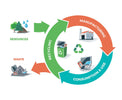
Recycling and Local Economies: How Sustainability Supports Communities
, by Planet Green, 2 min reading time

, by Planet Green, 2 min reading time
Recycling isn’t just good for the planet—it’s a powerful way to boost local economies. By investing in sustainable practices like remanufacturing, communities can create jobs, reduce waste, and build a stronger economic foundation.
The Economic Impact of Recycling
Recycling programs generate significant economic benefits by:
The Role of Remanufacturing
Remanufacturing takes recycling one step further by restoring used products to like-new condition. Companies like Planet Green Recycle remanufacture empty ink cartridges, transforming them into high-quality, reusable products. This process:
By keeping production local, businesses like Planet Green help communities thrive while promoting environmental sustainability.
Why Buy Local and Sustainable?
When consumers choose locally remanufactured products over imported alternatives, they support:
Combating the Impact of Imports
The influx of cheap, single-use imports from countries like China undermines both the environment and the economy. These products flood the market with low-cost, non-recyclable options, making it harder for sustainable businesses to compete. Supporting local recycling initiatives is a direct way to push back against these damaging practices.
How You Can Make a Difference
Here’s how individuals and organizations can support local economies through recycling:
A Win-Win for Communities and the Planet
Recycling is more than an environmental action—it’s an economic opportunity. By supporting local recycling and remanufacturing initiatives, we can build stronger communities while protecting the planet. Together, we can make sustainability a cornerstone of economic success.

When people talk about e-waste, the conversation usually centers on big-ticket items: cell phones, laptops, televisions, or kitchen appliances. But one of the most common...

Most people see a printer cartridge as a small, everyday item. But behind that small piece of plastic is a surprisingly large environmental cost. Every...

The phrase “circular economy” has become a buzzword in sustainability circles, but what does it really mean? In simple terms, it’s about designing products and...

For years, recycling ink cartridges often meant relying on office collection bins, retail drop-off points, or corporate programs tied to large accounts. But as more...